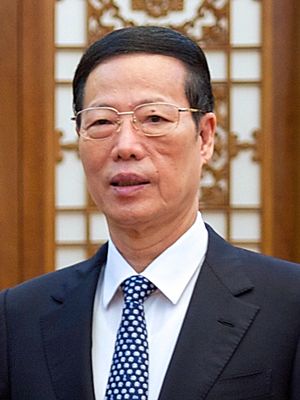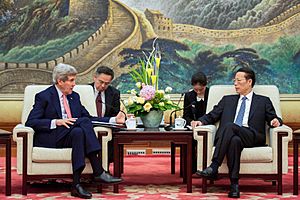Zhang Gaoli facts for kids
Quick facts for kids
Zhang Gaoli
|
|
|---|---|
|
张高丽
|
|

Zhang in 2014
|
|
| Vice Premier of China | |
| In office 16 March 2013 – 19 March 2018 |
|
| Premier | Li Keqiang |
| Party Secretary of Tianjin | |
| In office 25 March 2007 – 21 November 2012 |
|
| Deputy | Dai Xianglong (Mayor) Huang Xingguo |
| Preceded by | Zhang Lichang |
| Succeeded by | Sun Chunlan |
| Party Secretary of Shandong | |
| In office 23 November 2002 – 26 March 2007 |
|
| Deputy | Han Yuqun (Governor) |
| Preceded by | Wu Guanzheng |
| Succeeded by | Li Jianguo |
| Governor of Shandong | |
| In office 6 December 2001 – 13 January 2003 |
|
| Party Secretary | Wu Guanzheng |
| Preceded by | Li Chunting |
| Succeeded by | Han Yuqun |
| Personal details | |
| Born | November 1946 (age 79) Chinchiang County, Fukien, China |
| Political party | Chinese Communist Party |
| Spouse | Kang Jie |
| Children | 1 son Zhang Xiaoyan (adopted daughter) |
| Alma mater | Xiamen University |
|
Central institution membership
2002–2017: 16th, 17th, 18th Central Committee
2007–2017: 17th, 18th Politburo 2012–2017: 18th Politburo Standing Committee Leading group posts
2013–2018: Leader, Leading Group for Coordinating the South-North Water Transfer Project
2013–2018: Leader, Leading Group for Coordinating the Three Gorges Dam Project 2013–2018: Deputy Leader, Central Leading Group for Comprehensively Deepening Reforms 2014–2018: Leader, Leading Group for Coordinating the Joint Development of the Beijing-Tianjin-Hebei Region 2014–2018: Leader, Leading Group for Advancing the Development of the Yangtze River Delta 2015–2018: Leader, Leading Group for Advancing the Development of One Belt One Road 2015–2018: Leader, Leading Group for the Transformation of the State Council |
|
| Zhang Gaoli | |||||||||||||||||
|---|---|---|---|---|---|---|---|---|---|---|---|---|---|---|---|---|---|
| Simplified Chinese | 张高丽 | ||||||||||||||||
| Traditional Chinese | 張高麗 | ||||||||||||||||
|
|||||||||||||||||
Zhang Gaoli (Chinese: 张高丽; born in November 1946) is a Chinese politician who is now retired. He served as the first-ranking Vice Premier of China from 2013 to 2018. He was also a top member of the Politburo Standing Committee of the Chinese Communist Party (CCP) from 2012 to 2017. Before these important roles, Zhang was the Party Secretary of Tianjin from 2007 to 2012. He also led the Shandong province as Party Secretary from 2002 to 2007.
As the main assistant to Premier Li Keqiang, Zhang was in charge of many important areas. These included finance, economic growth, natural resources, the environment, and housing. He led special committees for big projects like the Three Gorges Dam and the South–North Water Transfer Project. He also oversaw the One Belt, One Road initiative and the Commission on Food Safety for the government.
Contents
Life and Career
Early Life and Education
Zhang Gaoli was born in November 1946 in a small village. This village was in Jinjiang County, Fujian province, China. He grew up in a farming family and was the youngest of five children. His family was not wealthy, and his father passed away when Zhang was only three years old. His mother raised him and his four siblings almost by herself. As a child, Zhang helped his family with farm work. He also caught fish in a nearby river to help provide for his family.
Zhang attended Jinjiang Qiaosheng High School (Chinese: 晋江侨声中学). In 1965, he went to Xiamen University to study economics. After finishing his studies in August 1970, Zhang began working. He was sent to an oil company in Maoming where he worked as a construction worker. His tasks included stocking materials in a warehouse and moving heavy concrete blocks.
Early Political Roles in Guangdong
In 1984, Zhang Gaoli started his political career. He was named the deputy party secretary of Maoming. This was his first step into government leadership. A year later, he became the head of the Guangdong Economic Commission. By 1988, he was promoted to Vice Governor of Guangdong province.
In 1993, at 47 years old, Zhang joined the provincial Chinese Communist Party Provincial Standing Committee. This made him one of the top leaders in the province. He also held other important jobs. He led the agency that helped develop the Pearl River Delta region. He was also in charge of the provincial planning agency.
In 1997, Zhang became the Party Secretary of Shenzhen. During his time in Shenzhen, he strongly supported the growth of the technology company Huawei. Later that year, he became an alternate member of the 15th Central Committee of the Chinese Communist Party (CCP). In 1998, he was made deputy provincial party secretary of Guangdong. He kept his leadership role in Shenzhen at the same time. He worked under the provincial party secretary Li Changchun and with executive vice governor Wang Qishan. It was said that former President Jiang Zemin praised him during this period. He was also known for visiting and helping Xi Zhongxun, who was the father of Xi Jinping.
Leadership in Shandong and Tianjin
In late 2001, Zhang Gaoli moved to the eastern coastal province of Shandong. He became the governor and deputy provincial party secretary there. In 2002, he was promoted to provincial party secretary. This made him the most important leader in Shandong province. While in Shandong, Zhang spoke to local officials. He told them, "whether it is my relatives, children, friends; if they go to where you are, please do not go out of your way to receive them, do not carry favour with them, and do not offer to do things for them." This showed that Zhang wanted to avoid corruption and special favors.
In 2007, Zhang was moved to the coastal city of Tianjin to become its party secretary. Tianjin is a very important city, directly controlled by the central government. As the leader of Tianjin, Zhang also gained a seat on the Politburo of the Chinese Communist Party. Many people thought Zhang would become a member of the "fifth generation" of China's leaders. In Tianjin, Zhang tried to keep a low profile. He was seen as a strong candidate for the CCP Politburo Standing Committee. However, he was less flashy than other regional leaders. His motto in Tianjin was "do more, speak less."
Becoming First-ranked Vice-Premier

After the 18th National Congress of the Chinese Communist Party in 2012, Zhang earned a seat on the CCP Politburo Standing Committee (PSC). This is China's highest decision-making body. He was the seventh-ranked member out of seven. On March 15, 2013, Zhang was appointed the first-ranking Vice Premier of China. He joined the government led by Premier Li Keqiang.
As Vice Premier, Zhang was put in charge of two very large projects. These were the Three Gorges Dam project and the South-North Water Transfer Project. He was also named the head of the Commission on Food Safety for the government. In February 2015, he became the leader of the group working on the One Belt One Road initiative. He also led groups for developing the Beijing-Tianjin-Hebei region and the Yangtze River Delta. In April 2015, he became the leader of the group for transforming the State Council.
Zhang also held other important roles. He was the deputy leader of the Central Comprehensively Deepening Reforms Commission. He was also a member of the group for financial and economic affairs. Additionally, he was the Vice Chairman of the National Energy Commission. Zhang's many leadership roles meant he played a big part in carrying out China's economic policies.
In 2013, Zhang talked about the idea of the Chinese Dream. This idea was introduced by President Xi Jinping. Zhang said that the Chinese Dream also includes the millions of people with disabilities in China.
Zhang retired from the Politburo Standing Committee after the 19th National Congress of the Chinese Communist Party in 2017. He stepped down as first-ranking vice premier in 2018. Han Zheng succeeded him in that role.
Personal Life
Zhang Gaoli is married to Kang Jie (Chinese: 康洁). They met when they were both working at the oil company in Maoming. They have one son, who was serving in the army as a junior officer around 2013. Zhang also has an adopted daughter named Zhang Xiaoyan (Chinese: 张晓燕). She is the biological daughter of his cousin. Zhang Xiaoyan is married to Li Shengpo (Chinese: 李圣泼). He is the son of a Hong Kong businessman named Lee Yin Yee from Xinyi Glass.
See also
 In Spanish: Zhang Gaoli para niños
In Spanish: Zhang Gaoli para niños
 | John T. Biggers |
 | Thomas Blackshear |
 | Mark Bradford |
 | Beverly Buchanan |

